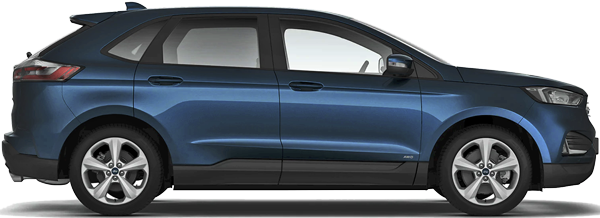The Comparative Analysis :
Ford Edge 2.0 EcoBlue 4x4 (18 - 19) vs. Mercedes EQC 400 4MATIC (19 - ..)
€ 42,900

€ 71,300

€ 42,900
Base Price ⓘBase price of a new vehicle with standard equipment in Germany at market launch.
€ 71,300
ⓘBase price of a new vehicle with standard equipment in Germany at market launch. Price Info
Vehicle Dimensions
The Ford Edge 2.0 EcoBlue is considerably bigger in every dimension. It's 2.6 inches longer, 1.7 inches wider and 5 inches taller than the Mercedes EQC 400.
Ford Edge 2.0 EcoBlue
Mercedes EQC 400
68.9
75.9
86
63.9
74.2
82.5
75.9 in
Width
74.2 in
86 in
Width Incl. Mirrors
82.5 in
68.9 in
Height
63.9 in
112.1
190
113.1
187.5
190 in
Length
187.5 in
112.1 in
Wheelbase
113.1 in
Vehicle Weight
Ford Edge 2.0 EcoBlue
Mercedes EQC 400
4480 lb
Curb Weight
5501 lb
5710 lb
Gross Vehicle
Weight
Weight
6482 lb

Weight Difference:
1021 lb
18.56 %

General
Ford Edge 2.0 EcoBlue
Mercedes EQC 400
SBF
Generation
N293
Sport Utility Vehicle
Car Body Style
Sport Utility Vehicle
Diesel
Fuel Type
Electricity

Permanent all-wheel drive (AWD)
Drivetrain
Permanent all-wheel drive (AWD)

6-speed manual transmission
Transmission
1-speed automatic transmission
Engine
Ford Edge 2.0 EcoBlue
Mercedes EQC 400
Straight-four diesel engine with turbocharger
Engine Type
Asynchronous motor
4
Valves
0
4
Cylinders
0
2 L / 98 cu in
Displacement
0 L / 0 cu in
187 hp
at 3500 rpm
Power
402 hp
at 0 rpm
Ford Edge 2.0 EcoBlue
187 hp
402 hp
Mercedes EQC 400
295 lb‑ft
at 2000 rpm
Max. Torque
561 lb‑ft
at 0 rpm
Ford Edge 2.0 EcoBlue
295 lb‑ft
561 lb‑ft
Mercedes EQC 400
Performance
Ford Edge 2.0 EcoBlue
Mercedes EQC 400
126 mph
Maximum Speed
112 mph
10.4 sec
Acceleration 0 to 62 mph
5.1 sec
62 mph
62
mph
mph
472 ft
0.000 sec

Ford Edge 2.0 EcoBlue
62 mph
62
mph
mph
233 ft
0.000 sec

Mercedes EQC 400
▶ REPLAY
23.96 lb/hp
Weight-to-Power Ratio
13.68 lb/hp
Ford Edge 2.0 EcoBlue
23.96 lb/hp
13.68 lb/hp
Mercedes EQC 400
Fuel Economy / Emissions
Ford Edge 2.0 EcoBlue
Mercedes EQC 400
Fuel Economy
39 mpg
( 44 MPGe ⓘ Miles per gallon gasoline equivalent (MPGe) is a measure of the average distance traveled per unit of energy consumed. MPGe, specified in miles per U.S. gallon, is used to compare the energy consumption of vehicles that use different energy sources.)
combined ✽ per 100 miles
32 kWh✽
( 105 MPGe ⓘ Miles per gallon gasoline equivalent (MPGe) is a measure of the average distance traveled per unit of energy consumed. MPGe, specified in miles per U.S. gallon, is used to compare the energy consumption of vehicles that use different energy sources.)
Ford Edge 2.0 EcoBlue
44 MPGe
105 MPGe
Mercedes EQC 400
33 mpg
city
No data
44 mpg
highway
No data
16.9 gal
Fuel Tank Capacity
80 kWh
663 mi
Range
252 mi
Ford Edge 2.0 EcoBlue
663 mi
252 mi
Mercedes EQC 400
Environmental Impact
123.4 kWh
Total Energy Consumption
per 100 miles ⓘThe total energy consumption per 100 miles is the amount of energy consumed by a vehicle when burning fuel or using electricity per 100 miles (final energy), and the energy required to produce the appropriate amount of fuel or electricity (primary energy).
per 100 miles ⓘThe total energy consumption per 100 miles is the amount of energy consumed by a vehicle when burning fuel or using electricity per 100 miles (final energy), and the energy required to produce the appropriate amount of fuel or electricity (primary energy).
64.1 kWh
Ford Edge 2.0 EcoBlue
123.4 kWh
64.1 kWh
Mercedes EQC 400
Euro 6d-TEMP (WLTP) 36AG-AI
Emission Standard
Elektrofahrzeug
274 g/mi (WLTP)
CO2 Emissions
0 g/mi (WLTP)
Practical Convenience
Ford Edge 2.0 EcoBlue
Mercedes EQC 400
5
Doors
5
5
No. of Seats
5
1230 lb
Maximum Payload
981 lb
17 cu ft
Trunk Volume
14.2 cu ft










52.3 cu ft
Cargo Volume (Seats Down)
41.3 cu ft


















